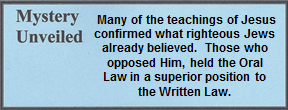08.03.04 Mt. 6:5-15
THE PRINCIPLE OF A MODEL PRAYER
5 “Whenever you pray, you must not be like the hypocrites, because they love to pray standing in the synagogues and on the street corners to be seen by people. I assure you: They’ve got their reward! 6 But when you pray, go into your private room, shut your door, and pray to your Father who is in secret. And your Father who sees in secret will reward you. 7 When you pray, don’t babble like the idolaters, since they imagine they’ll be heard for their many words.
8 Don’t be like them, because your Father knows the things you need before you ask Him.
9 “Therefore, you should pray like this:
Our Father in heaven,
Your name be honored as holy.
10 Your kingdom come,
Your will be done
on earth as it is in heaven.
11 Give us today our daily bread.
12 And forgive us our debts,
as we also have forgiven our debtors.
13 And do not bring us into temptation,
but deliver us from the evil one.
[For Yours is the kingdom and the power
and the glory forever. .]
14 “For if you forgive people their wrongdoing,
your heavenly Father will forgive you as well.
15 But if you don’t forgive people,
your Father will not forgive your wrongdoing.
The elements of this model prayer tell as much about us as about God.[1] It is commonly called the “Lord’s Prayer,” but in reality, it is the Disciple’s Prayer. Virtually every element of this prayer has a connection with Jewish prayer tradition.[2] For example, Matthew 6:13 is echoed in Benediction 6 and verse 11 is echoed in Benediction 9 of the Eighteen Benedictions.[3] Matthew 6:9-13 has echoes from Proverbs 30:7-9. Yet amazingly, Jesus omitted the weekly requirements of scheduled fasts and ritual prayers that were so important to the Pharisees, especially those of the School of Shammai.
The Lord’s Prayer has been used to establish the pattern for prayer throughout church history. There are two forms of it (Mt. 6:9-13; Lk. 11:2-4) and the early church fathers had a third version of it in chapter 8 of the Didache.[4] All three versions are simple, to the point, and are reflective of the prayers found in the rich Jewish traditions. Jesus desired to have His disciples continue the important points of the Jewish faith, while eliminating the dead traditional elements. Scholars believe the model prayer was composed entirely of selections of various liturgical prayers already in use in daily life. This is opposite to the spontaneous prayers often believed today to be the only ones heard by God.
For centuries it was the custom to pray three times a day, just as observant Muslims today face Mecca and pray five times a day. David prayed three times a day (Ps. 55:17) and Daniel, while in Babylon did likewise, facing Jerusalem (Dan. 6:10). Prayer was always a dedicated feature of Orthodox Judaism. The model prayer was prayed three times every day by the first Jewish believers[5] when the temple trumpets blew signaling the formal times of prayer. These were as follows:
- The morning prayers, called the Shacharit, at 9:00 o’clock, occurred at the time of the morning sacrifice in the temple. It was at this time of prayer that the Holy Spirit fell on the day of Pentecost (Acts 2:15).
- The 12:00 o’clock noon prayer was known as the Mincha, also known as the “sixth hour, “when Peter prayed (Acts 10:9).[6]
- The afternoon (also known as the “evening”) prayer was the Maariv at 3:00 o’clock,[7] known as the “ninth hour.”[8] Peter and John went to pray in the temple at the Maariv. It was also at this time that the “God-fearing” Greek Cornelius prayed when he saw his vision (Acts 10:3-5). Notice that Jesus never commented about prayers at specific times, as this was the Jewish custom. He did not forbid nor discourage specific prayer times.
The custom of organized prayers at set times has led some modern students to conclude that private prayers were minimal, but that was hardly the case. In Judaism, there was an emphasis on daily private and family prayers. The disciples certainly knew how to pray privately because during childhood, they learned to pray for the daily needs of life as well as the liturgical prayers for the synagogue. They asked Jesus this question because they saw the dynamic results of prayer in His life and desired the same results. There are a number of points that Jesus taught them.
- All prayers are to go to God the Father, not to Jesus or the Holy Spirit.
- Prayer is to honor God and
- Prayers are to be prayed on behalf of those working in the Kingdom of God (missionaries, pastors, etc.).
- There are prayers for one’s own needs as well as
- The forgiveness of sins and spiritual welfare.
On an important side note, when the Apostle Paul directed his followers to pray “without ceasing,” “continually,” or “always,” he did not mean uninterrupted prayer, but to observe the regular hours of prayer as had been the Jewish custom. The early church recited the Shema morning and evening[9] along with their morning and evening prayer – that was our Lord’s Prayer along with anything else that concerned them. At noon they prayed again but did not necessarily recite the Shema. This was not a legalistic issue, but one that righteous Jewish believers wanted to do. In addition to the Lord’s Prayer, they prayed for whatever else concerned them.[10]
“You must not be like the hypocrites.” Jesus reflected upon the Greek theater where plays were popular. The Greek word hypokrites (5695) meaning actor identifies the person who is not his real self, but portrays himself differently for the approval of the audience.[11] The subject is discussed elsewhere,[12] but the key point is that Jesus wants His followers to pray with honesty and sincerity, so prayers can be answered.[13] Jerusalem had a theater, much to the chagrin of orthodox religious leaders and, therefore, everyone understood the role actors played.[14] The leading Pharisees and the entire class of Sadducees played an important part of the ministry environment of Jesus, and He hated their hypocritical attitudes. He called them “hypocrites” nearly two dozen times, primarily for the following several reasons:[15]
- The core issue was that they pretended to be religious when they were not. They equated legalism with righteousness in the way some people today equate religious conservatism equal to a relationship with Jesus. The hypocrite was one who, in the name of religion, broke God’s laws.
- Religious leaders whose lives are filled with hypocrisy do incredible harm to others who look to their leaders as a role model of life (Mt. 23:13-15).
- They were arrogant and prideful – the same sin that prompted the downfall of Satan (Isa. 14:12-15). This attitude places one’s self above the needs and authority of God.
- Hypocrisy, with its arrogance, is in opposition to the character and purpose of God (Mt. 22:29-33). God calls the sinner to repentance while hypocrites condemn sinners, but then perform sins of their own behind closed doors.
- The hypocrite was one for whom goodness was “theatrical goodness” (Mt. 6:2, 16). They were seriously concerned as to how they appeared to others, and could not care less how God saw them.
- A hypocrite was one who was prideful, arrogant and often bitter, but hid his true feelings under a coat of deceptive piety.
- The result is that eventually the hypocrite becomes blind to the truth, believing that his own opinions are truth. He then leads others astray.[16]
The result is that eventually the hypocrite is a man of divine condemnation (Mt. 24:51). In the New Testament there is no sin more strongly condemned than hypocrisy, and likewise in secular culture.[17] The religious leaders loved to pray in public where everyone could admire their fine speech and sense of holiness. Note that Jesus participated in public prayers which was a common practice in the synagogues and has continued in the church.[18]
“When you pray, go into your private room.” Jesus emphasized private prayer to develop a private relationship with God. The Greek word for “private room” is tameion, which means a room.[19] Jesus simply indicated that when you pray you should be in a secluded area. It was commonly believed that when a man prayed, he went to a private area, wrapped his prayer shawl around his head, thereby shutting out the world and prayed. During His ministry, Jesus would at times retreat to a private area on a mountain where He could be away from the crowds to pray.
This tradition is centuries old, when the Jews, then known as the Children of Israel, wandered in the desert, they had a large tabernacle that functioned as their temple. Since not all the men could enter the tabernacle tent to pray, each man covered his head with a prayer shawl, creating his own private “tabernacle,” in which he could pray to God. Therefore, when Jesus said one should go to his “room” to pray, the cultural context means he covered his head with his prayer shawl and privately conversed with God. Some translations use the term “closet” even though closets did not exist at this time.
When people pray, just as in worship, they are to pray in spirit and in truth. God, who sees people as they really are, desires to have them come to Him in prayer so He can transform them into His image. He never intended to tell His disciples what to pray, but how to pray. To teach them how to pray, He reflected upon some prayers with which they were already familiar.
“Don’t babble like the idolaters.” The following examples most probably refer to this phrase:
- This statement was reflective of the worshippers of Baal on Mount Carmel (1 Kg. 8:36) and the worshippers of Diana in the amphitheater at Ephesus who yelled and screamed for two hours (Acts 19:34). Pagan incantations heaped up names of gods hoping that one would respond (1 Kg. 18:26-29; Acts 17:33; 19:11-20). In addition, many magical papyri have been discovered with repetitive prayers to God and other deities. Those who prayed did so for hours.[20]
- The phrase also has implications of rehearsed lines spoken by theater actors in Jerusalem. Some scholars have suggested the phrase “babbling” was speaking in tongues to demonic spirits.
It should be noted that at this time, silent prayers did not exist,[21] neither did silent reading as both skills were not developed for another three or four centuries. So wherever there was a prayer group, it was literally a joyful noise unto our Lord.
“Our Father in heaven, Your name be honored as holy. Your kingdom come.” There is little question that it was astounding when Jesus used the Aramaic word Abba for Father, just as He probably used imma for momma or mamma.[22] It was commonly used in reference to one’s earthly father and one’s local rabbi, which is why it is translated as Daddy,[23] although abi is the best translation for father.[24] It goes beyond formalities and adds a personal and affectionate element to one’s prayer life. Yet those first four words are a balance of love and power. Only a few decades later during the time of the apostles, Rabbi Jonathan ben Zakkai, the last disciple of the famous Rabbi Hillel who taught between the years A.D. 50 – 80, used this phrase.[25]
However, to address God in heaven in this manner was a new concept. A standard introduction to a Jewish prayer always began with, “Our Father in heaven.” This was to recognize their personal worshipful relationship to a holy God. This phrase was reflective of another prayer known as the Kaddish, which began, “Magnified and hallowed be His great name in the world …. And may He establish His kingdom in your lifetime and in your days … quickly and soon.”[26] The phrase, “Your kingdom come.” is not a command, but rather, it has the connotation of “may it be” or “let it be.” The same Hebrew expression, found in 1 Chronicles 28:4-5 is relative to the Davidic Kingdom when ruled by his son Solomon and the phrase is translated “to cause to reign.”[27]
“Your name be honored as holy.” In the Old Testament there are two ways that God’s name is sanctified.
- The first is by the lifestyle of a community of believers and
- By the way God responds to people. This phrase is an appeal that God’s name would be revered regardless of what we do.
Finally, the phrase, “Hallowed be your name,” (KJV) is a poetic parallel to “your kingdom come, your will be done on earth,” because God’s name will be hallowed when His will is done. The key Greek word is hagiazo (37), which means to make holy.[28] Another translation is, “May you sanctify your name by the way I obey your will and in the way I submit myself to your kingdom and commandments.”
The location of the phrase indicates the “kingdom” is marked by acknowledging and referencing the holiness of God with doing His will and service. The clause that follows points to the perfection which believers are to attain, that being to do the perfect will of God as He would have it done in heaven. This has at times been construed to mean that anything other than the “perfect will” is sin. But that is hardly the case, as the grace of God works with people to do His will. It was never intended to be a paralyzing command. This kingdom is within the believer and reflects the attitude we are to have that honors God and our desire to be in complete obedience to him.
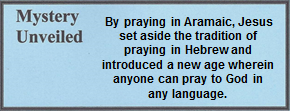
“Your will be done on earth as it is in heaven.” Our submission to Him is our confession. Near the end of the first century, Rabbi Eliezer was noted for reciting a prayer that stated, “Do your will in heaven above and give peace to those who fear you below.”[29] There was also a common belief that when Israel did the will of God, His name would be sanctified before the nations. Conversely, if Israel did not do the will of God, His Name would be profaned among the Gentile nations.
Notice that Jesus did not tell His disciples to pray, “If it be your will.” Rather, He taught them to think and pray biblically and to apply the Scripture to their lives (obedience). He knew that whatever was to be done on earth was first accomplished in heaven. The prime example of this occurred when He was in the Garden of Gethsemane and death was only a few hours away. It was then He prayed that His incredible sacrifice would be accomplished as was foreordained in heaven (Lk. 22:42).
“Give us today our daily bread.” Our petition is to God, and our faith is in God, who provides for all of our needs. This statement is an echo of the mealtime prayer as follows:
Blessed are you, O Lord our God, King of the universe, who feeds the whole world with your goodness . . . you give food to all mankind. Through your goodness, food has never failed us: O may it never fail us forever and forever.
Jewish Mealtime Prayer[30]
The term bread refers to the following:[31]
- It is synonymous for all food, not just baked bread.
- It is representative of Jesus Himself.
- It is representative of Scripture
To pray the Disciple’s Prayer is to invoke all three meanings into one’s prayer life.
“And forgive us our debts, as we also have forgiven our debtors.” The key idea clearly is about forgiveness. Through Jesus we are forgiven (Gk. aphiesthai 918), from whatever sin separates us from God.[32] The term has a wide variety of meanings, including an undeserved release of obligation, punishment, and other penalties that could be required. It is by His love, grace, and mercy that we are forgiven if we are repentant.
Our confession and His grace are sufficient to forgive us, as we are obedient and compassionate to forgive others.[33] Another way of saying this is “forgive us of our sins (Gk. for debts is opheilema 3783)[34] in proportion that we forgive the sins of others.” This portion of the Lord’s Prayer is reflective of the sixth benediction of the Eighteen Benedictions, or Shemoneh ‘esreh,[35] that Jews commonly prayed. It stated, “Forgive us, our Father, for we have sinned against you; blot out our transgressions from before your eyes. Blessed are you, O Lord.” [36] The phrase, “forgive our debtors” is an echo of a common teaching as found in Ben Sirach.[37]
“Forgive the wrong of your neighbor, and then your sins will be forgiven when you pray.”
Ben Sirach 28:2
Matthew used the Hebrew word debts while Luke, writing in Greek, used the word sins. The difference is insignificant. The English words sins and debts are both translated from the Aramaic word hoba.[38] Therefore when Jesus, who spoke He referred to sinners as well as to debtors. It should be remembered that each gospel writer wrote to a different audience. The Jews understood that the word debts had a spiritual significance, which needed divine intervention in the form of forgiveness.[39] The Greeks, to whom Luke was writing, would not have understood debts in that context, but they did understand the meaning of sins.[40]
About the year 170 B.C., the Jews, who were under the cruel dictatorship of Antiochus IV Epiphanes suffered severe persecution with possible extermination.[41] It was a time when faithful Jews hated their brothers (Jewish anti-Semitism) who renounced their faith in order to escape persecution and death. God intervened in a miraculous manner through the Maccabean Revolt. But in the midst of their suffering there was a righteous Jewish slave who wrote a magnificent passage on forgiveness. A portion of his words is as follows:
He that takes vengeance will suffer vengeance from the Lord,
and he will firmly establish his sins.
Forgive your neighbor the wrong he has done,
and then your sins will be pardoned when you pray.
Does a man harbor anger against another,
and yet seek for healing from the Lord?
Does he have no mercy toward a man like himself,
and yet pray for his own sins?
If he himself, being flesh, maintains wrath,
who will make expiation for his sins?
Remember the end of your life and cease from enmity,
remember destruction and death and be true to the commandments.
Remember the commandments,
and do not be angry with your neighbor;
Ben Sirach 28:1-6[42]
The teaching similarities between the Ben Sirach and Jesus of Nazareth are at times profound.[43] That is because both are based upon the same Old Testament Scriptures – but obviously Sirach lacks divine inspiration. St. Augustine made this insightful comment about the biblical phrase:
Forgive us our trespasses, as we forgive those who trespass against us. What if God should answer, “Why do you ask me to do what I promised, when you refuse to do what I have commanded?”
Augustine, The Lord’s Prayer Explained[44]
08.03.04.Q1 Why did Jesus pray, “do not bring us into temptation,” (Mt. 6:13) when James said that God doesn’t tempt us (Jas. 1:13-14)?
The phrase in question is found in the Lord’s Prayer, “And do not bring us into temptation, but deliver us from the evil one.” The difficulty is obvious: Why would a holy and loving God want to lead anyone into sin, especially when James 1:13-14 assures us that God will not tempt anyone with evil? This is another example of how a so-called “biblical difficulty” is the result of translation. The word temptation would better be translated as testing or challenging situations, when one decides to pass or fail the test or situation that he or she faces.[45] Another interpretation is do not permit us to go.[46] The English word tempt always suggests a seduction to commit evil, but this is wrong. The word does not mean surrender to evil, but it means a trial or test of any kind without a reference to moral quality.[47] The support for this interpretation is that the Greek word peirazein is better translated as test.[48] The testings of life are not intended to make anyone fall, but to strengthen them. An example is where God tested or tempted Abraham (Gen 22:1). The ultimate choice is ours and the prayer is to ask God to intervene on our behalf when we make decisions.
Clearly, God desires our dependence to be totally on Him. The phrase Jesus used was borrowed from liturgical morning and evening prayers that said “Cause me not to go into the hands of sin, and not into the hands of the transgression, and not into the hands of temptation, and not into the hands of dishonor.”[49] A parallel passage in the Babylonian Talmud reads as follows,
Bring me not into sin, or into iniquity, or into temptation, or into contempt.
Babylonian Talmud, Berakoth 60b
To surrender to the temptation and commit sin is to succumb to the pressure of the test or trial. In the prayer we are to ask God to keep us strong and keep us from failing. Luke did not record the first phrase; Matthew gave us the second phrase, which is a restatement of the first, for God to deliver us from the evil one or to deliver us from what is evil. The fact that the concept is stated twice is a Hebrew method of declaring its importance. The same theme is found repeated in Matthew 26:41 and parallels, where one is to watch and pray to our heavenly Father that one does not fall under the pressure and trials of life.
An old Jewish prayer said, “Keep falsehood and lies far from me; give me neither poverty nor riches, but give me only my daily bread” (cf. Prov. 30:8). The Hebraic word for bread (lehem) could also be translated “food,” and, in the cultural context, it means “all of man’s provisions.”[50] Jesus usually taught in Aramaic while the gospels were eventually written in Hebrew and Greek. Modern students may discover that the Hebrew idioms, which present a richer and deeper meaning, are at times missing from the Greek translations. This is a classic example of the importance of understanding the Jewish roots of Christianity. In this case, when Jesus spoke of “bread,” He had reference to all the necessities of life.
The teachings of Jesus point to the desire of God to have people live in holiness. This principle is taught throughout the Old Testament Scriptures and was demonstrated by Jesus. By the power of the Holy Spirit, believers are able to obey the Word of God and not have sin dominate their lives.[51] This has become known as the doctrine of sanctification. In fact, the phrase “kingdom of God,” means that God rules in one’s life. The daily sins that one commits are removed by the blood of Jesus. That accomplishes holiness.
08.03.04.Q2 Is the Lord’s Prayer of Matthew 6:9-13 the same as in Luke 11:2-4?
These two prayers are similar, yet different. He wanted His followers to pray issues of the heart rather than memorized liturgical prayers that can easily become rote and meaningless. It must be remembered that Jesus taught His principles in many different settings. Although His words may be slightly different from one location to another, the message was always the same. Clearly Matthew and Luke quoted the same teaching in two different settings, so the quotations may not be identical. (See also 08.03.04.Q4 “Ipsissima Verba” and “Ipsissima Vox” below.) Note the following:
Matthew 6:9-13 (NIV 1984) Luke 11:2-4 (NIV 1984)
He said to them,
This, then, is how you should pray. “When you pray, say:
Our Father in heaven, Father,
Hallowed be your name. Hallowed be your name
Your kingdom come. Your kingdom come.
Your will be done
on earth as it is in heaven.
Give us this day our daily bread. Give us each day our daily bread
And forgive us our debts And forgive us our sins
As we also have forgiven our debtors. for we also forgive anyone who sins against us.
And lead us not into temptation And lead us not into temptation.
But deliver us from the evil one.
Another example of quotations not being identical is found in the following:
Mt. 16:16 “You are the Messiah, the Son of the living God!”
Mk. 8:29 “You are the Messiah!”
Lk. 9:20 “God’s Messiah!”
Unfortunately, while Jesus did not want this prayer to become liturgical, that is precisely what happened and has continued for centuries. The model prayer was immediately adopted by His faithful followers. It became a part of the messianic Jewish synagogue liturgy and, by the end of the first century it was incorporated in chapter 8 of the Didache, a/k/a The Teaching of the Twelve Apostles. This instructional book was written to meet the needs of the early growing church.[52] Scholars believe that Jewish liturgy was modified and used in the first Jewish churches,[53] especially since the first churches were Jewish in nature and they were reflective of the Jewish traditions.
Some scholars have suggest that since Luke wrote to a Gentile audience, he probably omitted the expression “who is in heaven” because the Gentiles believed the god Zeus Olympus resided in heaven.[54] No gospel writer wanted to confuse the God of Abraham, Isaac, and Jacob with Zeus Olympus or any other pagan deity. Modern students are seldom aware of the strong influences of Greek religions upon the Jewish culture. The disciples never attacked other religions, but simply demonstrated that faith in Jesus was superior to other gods.
08.03.04.Q3 How can the Kingdom of God be a future event if it has already arrived?
Some passages state that the Kingdom of God is near or present,[55] while others state the kingdom will be a future event.[56] The two seeming contradictions are explained in that the Kingdom is near or present in part, but will be fulfilled at a future time. Consider these thoughts:
- The present Kingdom of God: The Kingdom of God is established in one’s life as Jesus transforms the character of that person into the image of God. That process is known as sanctification and, since God reigns within that person, the Kingdom has arrived even though it has not fully matured.[57]
- The future Kingdom of God: On the other hand, the Kingdom of God will come at a future time when Jesus rules and reigns over all nations from His throne in Jerusalem.[58] His followers do not know when He will return to establish His thousand-year Kingdom, but there are signs of its nearness.
Therefore, the Kingdom of God is present in those who have committed themselves to Him, and yet it is coming in a future time as a political entity. For additional details, see 06.01.08.Q2 “Is there a difference within the phrases Kingdom of God/Heaven?” Both John the Baptist and Jesus preached repentance, but Jesus added the good news of the arrival of the Kingdom of God.
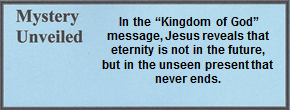
The unique feature of the Kingdom of God/Heaven is that it is built upon the Old Testament. There are no less than 295 Old Testament quotations found in the New Testament, as well as a number of general references.
A Lesson in First Century Hermeneutics:
08.03.04.X The Mystery of “Ipsissima Verba and Ipsissima Vox.”
Understanding these terms and their use in biblical times will bring considerable clarification for passages that do not seem to be in perfect agreement. The explanation begins with the following question:
08.03.04.Q4 What is the significance of verbal statements, “ipsissima verba” and “ipsissima vox?”
It is the opinion of this writer that the importance of these two phrases have grossly been understated, and unfortunately, sometimes not at all. Knowing how people communicated clarifies many so-called biblical difficulties. In ancient times there were two ways of reporting what was said, and both were deemed accurate. Note the emphasis on “accurately repeating.”[59]
- The Latin phrase ipsissima verba (ip·sis·si·ma ver·ba) means the exact words verbatim, that were spoken.[60] The modern equivalent is an exact quotation.
- On the other hand, the Latin term ipsissima vox means the exact voice.[61] This phrase may not be a verbatim statement but the idea or theme that was spoken is precise. The ipsissima vox is more precise than the modern “paraphrase” and, in fact, there is no English counterpart to this Latin phrase. Therefore, any difference in wording does not undermine the essential theme or message, because two people might naturally convey the same idea differently.[62]
Ancient writers had no difficulty in considering these two kinds of verbal expressions as identical. The gospel writers were not necessarily interested in recording the exact words of Christ, but they always recorded His exact voice.[63] This view or understanding of the gospel writers is consistent with the Greek historian Thucydides, who made the following comments about repeating the exact substance of speeches:
It was difficult for me to remember the exact substance of the speeches I myself heard and for others to remember those they heard elsewhere and told me of … I have given the speeches in the manner in which it seemed to me that each of the speakers would best express what was needed to be said about the ever-prevailing situation, but I have kept as close as possible to the total opinion expressed by the actual words.
Thucydides, History of the Peloponnesian War, 1.22.1[64]
It is evident from ancient Greek writers that it was permissible to record the primary theme or exact voice (vox) faithfully, rather than obtain an exact quotation or exact words (verba). Scholars agree that the accuracy of the gospel message does not demand verbal precision.[65] An example of Jewish writers conveying ideas without exact wording was discovered in a Dead Sea Scroll fragment 4Q521, which is explained in this author’s commentary on Luke 7:18-23.[66] Finally, righteous Jews of the time, who apparently were lower level Pharisees, had a prayer similar to what Jesus had suggested as a model prayer. Note the similarity:
May your will be done in heaven above,
and grant peace and contentment to those who fear You,
and do whatever seems best to You.
Mishnah, Berakoth 3:7
May it be Your will, O Lord my God,
to make me familiar with your Law,
and cause me to adhere to your commandments.
Do not lead me into sin,
nor into iniquity,
nor into temptation,
nor into dishonor.
Compel my impulses to serve You,
and keep me far from an evil man or evil temptations.
Give me good desires and good companions in this life.
And let me this day and every day find grace,
favor and mercy in Your eyes
and in all the eyes who see me,
and grant me Your best blessings.
Blessed are You, O Lord, who grants Your best blessings to Your people, Israel.
Babylonian Talmud, Berakoth 60b
Another example of the exact voice (vox) and the exact words (verba) is the Roman titulus,[67] the sign on the cross that identified Jesus, where each of the four gospel writers wrote the same theme but used different wording.
Video Insert >
08.03.04.V The Significance of Ipsissima Verba and Ipsissima Vox. Dr. Joe Wehrer discusses the significance of “ipsissima verba” and “ipsissima vox” to biblical interpretation.
Finally, the important significance of this comparison is that Jesus was not teaching a radical new theology. The Jews had already heard the essence of His teachings. He was simply bringing to them the “fullness,” as promised in their Hebrew Bible and applied to His message of the Kingdom of God and salvation.
< ——————————————– >
[1]. It is interesting that dancing is the only kind of expression of praise and prayer that is not in the New Testament. In the Hebrew Bible there are eleven Hebrew verb roots related to dancing. For example, the verb hul, means to whirl, to dance, or to writhe, is found in Psalm 87:7. The fact, that there are so many expressions has led some scholars to conclude that the Israelites may have developed an advanced stage of choreography. Pilch, The Cultural Dictionary of the Bible. 124-25.
[2]. For a collection of Jewish traditions connected with the Lord’s Prayer, see Georg Strecker, The Sermon on the Mount: An Exegetical Commentary. Trans O.C. Dean, Jr. (Nashville: Abingdon Press, 1988) 108-09.
[3]. The Eighteen Benedictions were prayers that were prayed three times every day. See Appendix 18 “Eighteen Benedictions.” See also Byargeon, “Echoes of Wisdom in the Lord’s Prayer (Matt 6:9-13).” 353-66.
[4]. See 02.02.08 for additional information on the Didache.
[5]. Didache, 8.3.
[6]. De Vries, “Hour.” 2:657.
[7]. See discussion on “Evening” in Appendix 16.
[8]. Garr, Restoring Our Lost Legacy. 137-38.
[9]. See discussion on “evening” in Appendix 16; Vine, “Even, Evening, Eventide.” Vine’s Complete Expository Dictionary. 2:108.
[10]. Jeremias, The Prayers of Jesus. 72-73.
[11]. Herbert, “Hypocrite.” 109-10.
[12]. See the discussion on hypocrites / hypocrisy in 08.03.04 (Mt. :5-15) and in “Pharisees” in 02.01.14.
[13]. Hindrances to answered prayers are lack of honesty and sincerity (above), unconfessed sin (Ps. 66:18); carnal motives (Jas. 4:3); unbelief (Jas. 1:5-6); satanic activities (Dan. 10:10-13); domestic problems (1 Pet. 3:7); pride (Lk. 18:10-14); robbing God – failure to pay tithes (Mal. 3:8-10); disobedience (Prov. 1:24-28; 28:9; Zech. 7:11-14).
[14]. The location of the theater in Jerusalem has not been found as of this writing, but several seat tokens have been uncovered by archaeologists.
[15]. Adapted from Barclay, A New Testament Wordbook. 56-59.
[16]. Gal. 2:13; 1 Tim. 4:2; 1 Pet. 2:1.
[17]. Barclay, A New Testament Wordbook. 56-57.
[18]. Mt. 18:19-20; Acts 1:24; 3:1; 4:24-30.
[19]. Lang, Know the Words of Jesus. 86-87.
[20]. Bock, Jesus According to Scripture. 140.
[21]. Lang, Know the Words of Jesus. 87.
[22]. Smith, Augsburg Commentary on the New Testament: Matthew. 110.
[23]. Strong’s No. 5; While the term abba has often been defined as a child’s expression of daddy, language scholar James Barr has suggested that abba was a solemn adult address to father; See Pilch, The Cultural Dictionary of the Bible. 2; Mould, Essentials of Bible History. 530; Vine, “Abba.”Vine’s Complete Expository Dictionary. 2:1.
[24]. Lang, Know the Words of Jesus. 362-63.
[25]. Jeremias, The Prayers of Jesus. 16; For an extensive study on the word Abba, see Joachim Jeremias, The Prayers of Jesus 11-65; Parry, The Complete Idiot’s Guide to the Talmud. 38-39.
[26]. Freeman, The New Manners and Customs of the Bible. 414.
[27]. Young, The Jewish Background. 11.
[28]. Vine, “Hallow.” Vine’s Complete Expository Dictionary. 2:300 and “Hades” 2:287.
[29]. Freeman, The New Manners and Customs of the Bible. 414, quoting the Babylonian Talmud, Berakoth.
[30]. Freeman, The New Manners and Customs of the Bible. 413-14.
[31]. Cranefield, “Bread.” 37.
[32]. Barclay, A New Testament Wordbook. 53-55.
[33]. See 02.03.03 “Economy” for a brief description of the condition of the economy during the ministry years of Jesus.
[34]. Opheiletes – “One who owes anything to another.” Vine, “Debtor.” Vine’s Complete Expository Dictionary. 2:150.
[35]. Barclay, “Matthew.” 1:192; See also Appendix 18, “The Eighteen Benedictions.”
[36]. Freeman, The New Manners and Customs of the Bible. 415.
[37]. The book is known by several variations of the name ben Sirach, such as as Ecclesiasticus, Jesus ben Sirach, or Sirach.
[38]. Bailey, Jesus through Middle Eastern Eyes. 252.
[39]. Taylor, “Debt, Debtor.” 61-62.
[40]. Young, The Jewish Background. 30.
[41]. See 03.04.17.
[42]. Cited by Freeman, The New Manners and Customs of the Bible. 415; Ben Sirach and Tobit belong to a classification of extra-biblical books known as the Apocrypha. These two literary works reflect the opinions of many Jewish people. See 02.02.03 “Apocrypha” for more information. The reader is reminded that quotations from non-biblical sources are not to be understood as being of equal authority with the biblical narratives. See 01.02.04.
[43]. The framework of a prayer in Jubilees 12:19-20, written in the second century B.C., is strikingly similar to the Lord’s Prayer.
[44]. Thomas, The Golden Treasury of Patristic Quotations: From 50 – 750 A.D. 106.
[45]. Carson, “Matthew” 8:172-73; Young, The Jewish Background. 31-32; See also Mishnah, Avot 5:3.
[46]. Bailey, Jesus through Middle Eastern Eyes. 131.
[47]. Vincent, Word Studies in the New Testament. 1:43-44.
[48]. Barclay, “Matthew.” 1:224.
[49]. Freeman, The New Manners and Customs of the Bible. 415.
[50]. Young, The Jewish Background. 24.
[51]. For additional references on the doctrine of sanctification, see Heb. 12:14; 1 Pet. 1:14-16; 1 Thess. 5:23-24; 1 Jn. 2:6; Rom. 8:3.
[52]. Martin, Worship in the Early Church. 35.
[53]. Ajamian, “People, Land, and Faith – An Armenian-Orthodox Perspective.” 74.
[54]. Young, The Jewish Background. 4.
[55]. Mt. 3:2; 4:17; 12:34; Lk. 17:21. For further study, see John F. Walvoord. Matthew: Thy Kingdom Come. Chicago: Moody, 1974.
[56]. Mt. 25:1; Jn. 18:36; Acts 1:6-7
[57]. See Mt. 11:12; 12:28; 16:19; Lk. 11:20; 16:16; 17:21 as well as the parables of the Sower, the Tares, the Levean, and the Dragnet.
[58]. See Dan. 7:27; Mt. 13:43; 19:28; 25:34; 26:29; Mk. 9:47; 2 Pet. 1:11; 1 Cor. 9:9; Rev. 20. See also Richardson, “Kingdom of God.” 119-21. Vincent, Word Studies in the New Testament. 1:310-11.
[59]. Jeremias, The Prayers of Jesus. Appendix; Hatch, The Influence of Greek Ideas and Usages. vii.
[60]. Charlesworth, Jesus within Judaism. 166; Hatch, The Influence of Greek Ideas and Usages. vii.
[61]. Charlesworth, Jesus within Judaism. 166; Hatch, The Influence of Greek Ideas and Usages. vii.
[62]. Hagner, “Jesus and the Synoptic Sabbath Controversies.” 270. A classic example are the descriptions of Jesus that were written on the titulus, which was then carried before Him as He was led to the crucifixion site. These descriptions are discussed later in this eBook.
[63]. Barclay, Jesus. 243; Hagner, “Jesus and the Synoptic Sabbath Controversies.” 268.
[64]. Cited in Bock and Herrick, Jesus in Context. 73-99. See expanded comments by Thucydides in sections 1.21-22.
[65]. These scholars hold to the Reformed Doctrine of Biblical Inspiration on the concept of Ipsissima Vox: Stonehouse, Origins of the Synoptic Gospels. 109-10; Murray, Calvin on Scripture and Devine Sovereignty. 30; Hodge and Warfield, “Inspiration.” 238.
[66]. See 08.05.04.
[67]. See “An Illustration of a Roman Titulus” at 16.01.11.A. The titulus was a wooden placard carried by the condemned or by the lead soldier, on which was written the reason for the execution.
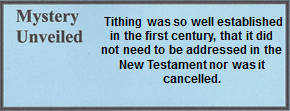


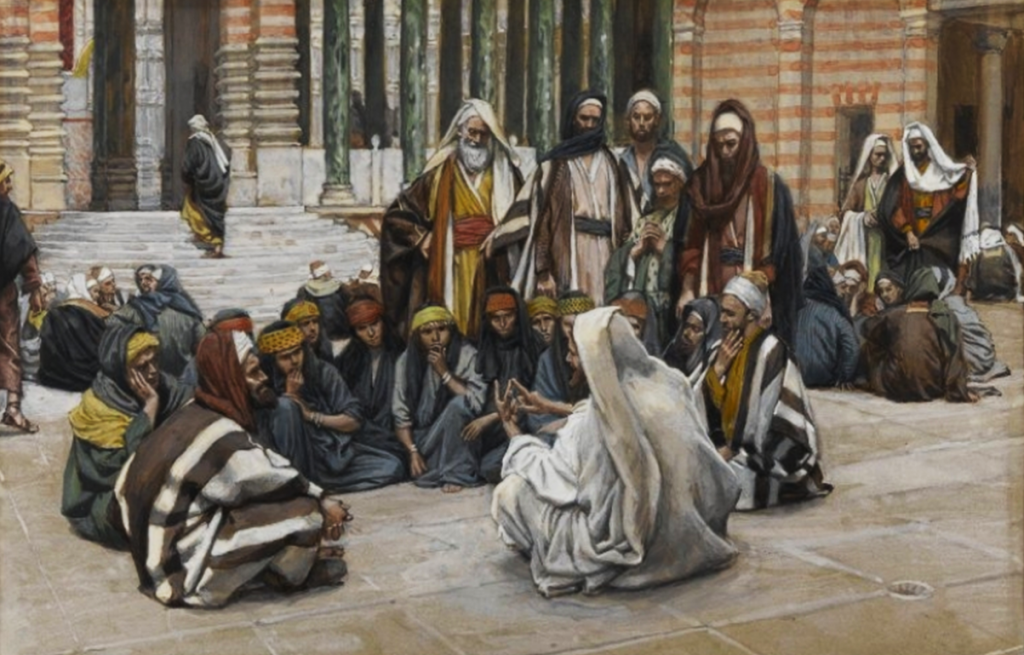 08.04.00.A. JESUS SPEAKS NEAR THE TREASURY by James Tossit. Jesus spoke on the spiritual treasures of the Kingdom of God while near the temple treasury where many kept their personal funds.
08.04.00.A. JESUS SPEAKS NEAR THE TREASURY by James Tossit. Jesus spoke on the spiritual treasures of the Kingdom of God while near the temple treasury where many kept their personal funds.


